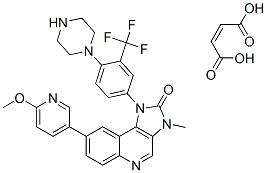All AbMole products are for research use only, cannot be used for human consumption.

BGT226 (NVP-BGT226) is a novel phosphoinositide 3-kinase/mTOR dual inhibitor. BGT226 (NVP-BGT226) displays potent growth-inhibitory activity against human head and neck cancer cells in vitro and in vivo.
| Cell Experiment | |
|---|---|
| Cell lines | FaDu, Detroit 562, HONE-1 and HONE-1-C15 cells line |
| Preparation method | Growth-inhibition assay. Cells in the logarithmic growth phase were cultured at a density of 5,000 to 20,000 cells per milliliter per well in a 24-well plate. The cells were exposed to various concentrations of BGT226 for 3 generation times. At the end of the incubation period, cells were fixed and stained with 50% ethanol containing 0.5% methylene blue for 30 minutes. The resulting colored residues were dissolved in 1% N-lauroyl-sarcosine, and optical density was read at 550 nm using a microplate reader. The IC50 value resulting from 50% inhibition of cell growth was calculated graphically as a comparison with control groups. Each point represents the average of at least 3 independent experiments run in duplicate. |
| Concentrations | IC50 ranging from 7.4 to 30.1 nmol/L |
| Incubation time | 48 h |
| Animal Experiment | |
|---|---|
| Animal models | human FaDu xenografted mice |
| Formulation | dissolved in 90% N-methyl-2-pyrrolidone (NMP)/10% PEG300 |
| Dosages | 3.5 and 5mg/kg once a day for 21 consecutive days |
| Administration | orally |
| Molecular Weight | 650.6 |
| Formula | C32H29F3N6O6 |
| CAS Number | 1245537-68-1 |
| Form | Solid |
| Solubility (25°C) | DMSO |
| Storage |
Powder -20°C 3 years ; 4°C 2 years In solvent -80°C 6 months ; -20°C 1 month |
| Related PI3K Products |
|---|
| T-00127-HEV1
T-00127-HEV1 is a phosphatidylinositol 4-kinase III beta (PI4KB) inhibitor with an IC50 of 60 nM. |
| PI3Kγ inhibitor AZ2
PI3Kγ inhibitor AZ2 is a highly selective PI3Kγ inhibitor (The pIC50 value for PI3Kγ is 9.3). |
| NIBR-17
NIBR-17 is a pan-class I PI3K inhibitor with suitable pharmacokinetic properties and inhibits tumor growth. |
| RV-1729
RV-1729 is an inhibitor of the phosphatidylinositol 3-kinase-δ (PI3Kδ). |
| Vulolisib
Vulolisib is a potent and orally active phosphatidylinositol 3-kinase (PI3K) inhibitor, with IC50 values of 0.2 nM, 168 nM, 90 nM and 49 nM for PI3Kα, PI3Kβ, PI3Kγ and PI3Kδ, respectively. |
All AbMole products are for research use only, cannot be used for human consumption or veterinary use. We do not provide products or services to individuals. Please comply with the intended use and do not use AbMole products for any other purpose.


Products are for research use only. Not for human use. We do not sell to patients.
© Copyright 2010-2024 AbMole BioScience. All Rights Reserved.
